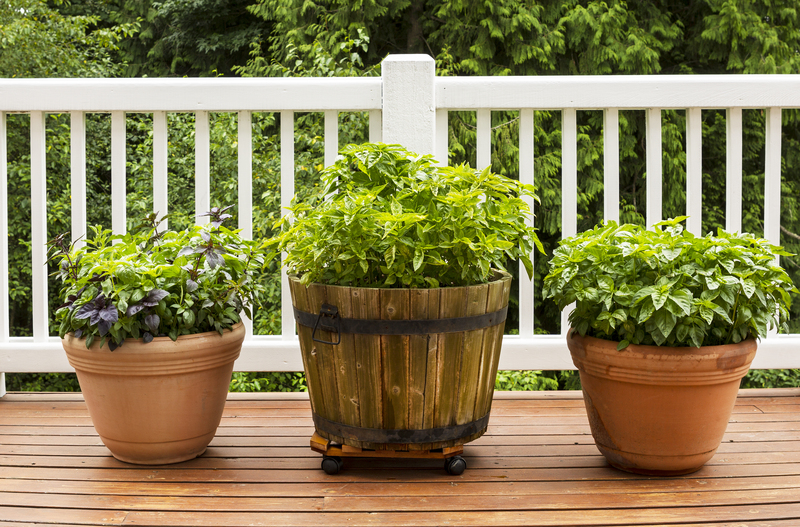Eco-Friendly Ways to Recycle Kitchen Waste
Posted on 17/08/2024
In our daily quest for sustainability, managing kitchen waste effectively stands as a significant challenge. Recycling kitchen waste not only minimizes the environmental impact but also contributes to a more sustainable lifestyle. In this article, we'll explore several eco-friendly ways to recycle kitchen waste.
1. Composting: Nature's Way of Recycling
Composting is one of the most effective methods of recycling kitchen waste. By breaking down organic matter into nutrient-rich compost, you can create a natural fertilizer for your garden.
Steps to Start Composting:
- Choose a Compost Bin: There are various types of compost bins available, from simple open piles to closed bins that speed up the composting process.
- Add Organic Waste: Collect kitchen scraps like vegetable peels, fruit rinds, coffee grounds, and eggshells. Avoid adding meat, dairy, or oily foods.
- Layer and Turn: Alternate layers of green waste (fresh scraps) with brown waste (dry leaves, cardboard). Turn the pile regularly to aerate it.
- Monitor Moisture: Ensure the compost remains moist but not soaking wet.

2. Vermicomposting: Let Worms Do the Work
Vermicomposting uses worms to decompose organic waste, producing nutrient-rich worm castings.
How to Start Vermicomposting:
- Select a Container: Choose a ventilated container and add bedding material like shredded newspaper or coconut coir.
- Add Worms: Red wigglers are the most effective worms for composting.
- Feed the Worms: Add kitchen scraps in small amounts. Avoid adding too much acidic or spicy food.
- Harvest the Castings: As the worms break down the waste, you'll collect dark, crumbly worm castings perfect for plant fertilizer.
3. Bokashi: Fermentation Method
Bokashi composting is an anaerobic process that ferments kitchen waste using a special Bokashi bran.
Using Bokashi in Your Kitchen:
- Get a Bokashi Bin: These bins are airtight and come with a spigot to drain liquid.
- Layer Waste and Bran: Alternate layers of food scraps with Bokashi bran. Press down to remove air.
- Seal and Ferment: Keep the bin sealed. Fermentation takes about two weeks.
- Bury the Waste: Once fermented, the waste can be buried in the garden or added to a compost bin for further decomposition.
4. Recycling Leftover Food
Instead of disposing of leftover food, consider creative ways to recycle it.
Ideas to Reuse Leftovers:
- Soup and Stocks: Use vegetable peels, meat bones, and leftover veggies to make delicious stocks and soups.
- Smoothies: Overripe fruits can be perfect for smoothies.
- Bread Crumbs: Stale bread can be turned into bread crumbs for cooking.
- Freeze for Later: Freeze leftovers in appropriate portions for future meals.
5. Making Eco-Enzymes
Eco-enzymes are homemade cleaning solutions made from kitchen waste.
Creating Eco-Enzymes:
- Collect Citrus Peels: Lemon, orange, and lime peels work the best.
- Add Sugar and Water: Mix citrus peels with sugar and water in a ratio of 3:1:10.
- Ferment: Let the mixture sit for about three months, releasing gas regularly.
- Use as Cleaner: Once ready, dilute the eco-enzyme and use it as a natural cleaner.
6. Upcycling and Repurposing
Beyond composting, consider upcycling and repurposing kitchen waste creatively.
Upcycling Ideas:
- Citrus Candles: Turn citrus peels into natural, aromatic candles.
- Vegetable Dye: Use avocado pits and red onion skins to create natural dyes for fabrics.
- Flower Pots: Empty cans and bottles can become quirky flower pots.
Pros and Cons of Recycling Kitchen Waste
Pros:
- Environmental Impact: Reduces the volume of waste in landfills.
- Nutrient-Rich Compost: Provides natural fertilizer for gardens.
- Economic Benefits: Reduces costs associated with waste management.
Cons:
- Initial Effort: Setting up composting or vermicomposting requires time and effort.
- Odor Control: Managing odors can be challenging.
- Space Requirement: Composting needs space which may not be available in small apartments.
Tips for Effective Kitchen Waste Recycling
- Keep a Scraps Container: Use a designated container for kitchen scraps.
- Educate Household Members: Ensure everyone knows what can and can't be composted.
- Avoid Non-Compostables: Avoid adding plastic, metals, or chemically treated wood.

Key Takeaways
- Composting and vermicomposting are excellent for recycling organic kitchen waste.
- Bokashi composting is a great option for those with limited space.
- Leftovers can be creatively reused in various kitchen applications.
- Eco-enzymes and upcycling offer innovative ways to recycle waste.
Conclusion
Recycling kitchen waste in an eco-friendly manner not only helps the environment but also offers numerous benefits for your garden and home. With methods like composting, vermicomposting, Bokashi, and creative reuse, you can significantly reduce your kitchen waste footprint. By implementing these techniques and educating your household, you can make a positive impact and contribute to a sustainable future.
Latest Posts
Must-Try Planting Concepts for a Beautiful Autumn Garden
DIY Guide to Perfectly Sharpening Garden Shears at Home
Essential Techniques for Maintaining Clean and Lush Artificial Grass
Transform Your Space With Meaningful Zen Garden Plant Choices




